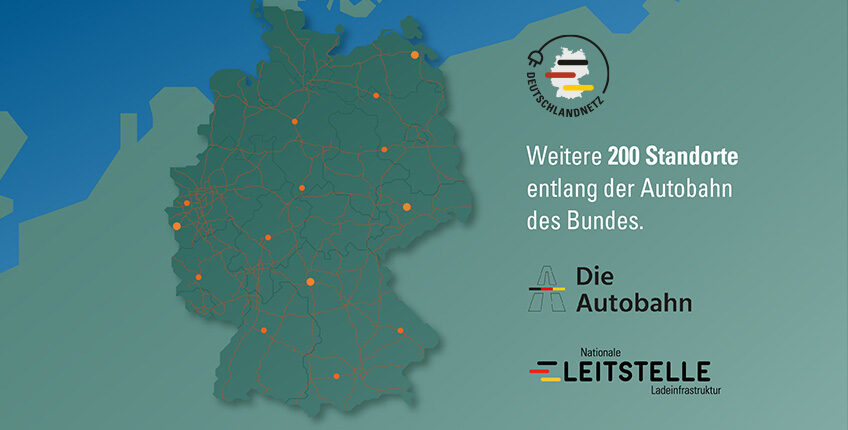The latest tender for 200 fast-charging locations of the Deutschlandnetz at unmanned rest areas along Germany’s motorways was kicked off on 20 December 2021. The tender is being conducted by the federal motorway company, Autobahn GmbH. It represents the second partial tender of the Deutschlandnetz – the BMDV already commenced the tendering procedure for 900 fast-charging locations nationwide at transport hubs in both urban and rural areas on 1 October 2021.
With the Deutschlandnetz, a central building block of the overall strategy formulated in the federal government’s master plan for charging infrastructure is being implemented. The most important goal of the Deutschlandnetz is to fill the “white spots” on the charging map in order to come one step closer to covering the areas and needs for the whole of Germany. In total, around 10,000 charging points with over 200 kW are to be created at the more than 1,000 locations along the main transport axes as well as in urban and rural areas. With this project, Germany is the first non-city-state country to secure a comprehensive, nationwide fast-charging infrastructure network.
In the tender, which commences on 20 December, the construction and operation of a total of 200 new fast-charging locations will be awarded in six nationwide lots, each with 32 to 34 locations. The six lots will each include 140 to 166 new high-performance fast-charging points at unmanned rest areas along the federal motorways. Initially, interested companies can submit applications for participation until 25 January 2022.
Dr Volker Wissing, Federal Minister for Digital Affairs and Transport: “The expansion of the charging infrastructure in Germany is one of my major concerns. We can only convince people to switch to climate-friendly electric mobility if we ensure that they can charge their vehicles everywhere, even on longer journeys. Only if charging becomes as easy as refuelling and becomes part of everyday life will we be able to take people with us on the journey towards achieving the mobility of the future and climate neutrality. With today’s launch of the tender for the motorway lots on 200 unmanned motorway rest areas, we want to ensure that infrastructure continues to be developed throughout the country for medium and long-distance journeys. too.”
Kurt-Christoph von Knobelsdorff, Managing Director of NOW GmbH: “The Deutschlandnetz is an infrastructure project that is unique in the world and represents a paradigm shift in government support for the development of charging infrastructure: The federal government is kick-starting a market-based competition and the winners are obliged to set up and guarantee the operation of the charging points. And with its planning tools, the National Centre for Charging Infrastructure, in turn, ensures that they are built wherever they are needed.”
Johannes Pallasch, Spokesperson of the Management Team at the National Centre Charging Infrastructure: “A tightly-knit fast-charging network along the motorways is a prerequisite for the successful electrification of road traffic, which is essential for climate protection. With the 200 new locations of the Deutschlandnetz at unmanned motorway rest areas, we are systematically eliminating the ‘white spots’ on motorways, comprehensively and in line with demand. Fast charging on medium and long-distance routes will thus become a matter of course everywhere in Germany.”
The combined total of locations from both tenders represents a decisive step towards nationwide coverage. The locations of the Deutschlandnetz are suitable for setting standards in terms of performance and user-friendliness. The technical requirement analyses and the demand planning conducted by the National Centre for Charging Infrastructure are the foundation of both of the partial tenders for the Deutschlandnetz.
The tender for the Deutschlandnetz anticipates the strong future growth in demand for fast-charging infrastructure and thus enables an unrestrained market ramp-up for electric vehicles. In this way, the Deutschlandnetz strengthens acceptance among users. The tender is therefore making a decisive contribution to the suitability of electric mobility for medium and long distances and complements the federal government’s funding and financing landscape for charging infrastructure.
The tender documents are available on the tender platform TED, the Supplement to the Official Journal of the European Union.
Further information:


